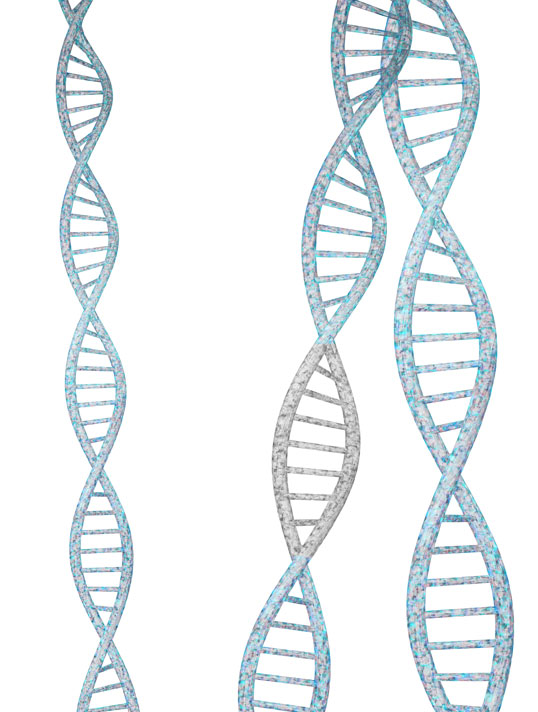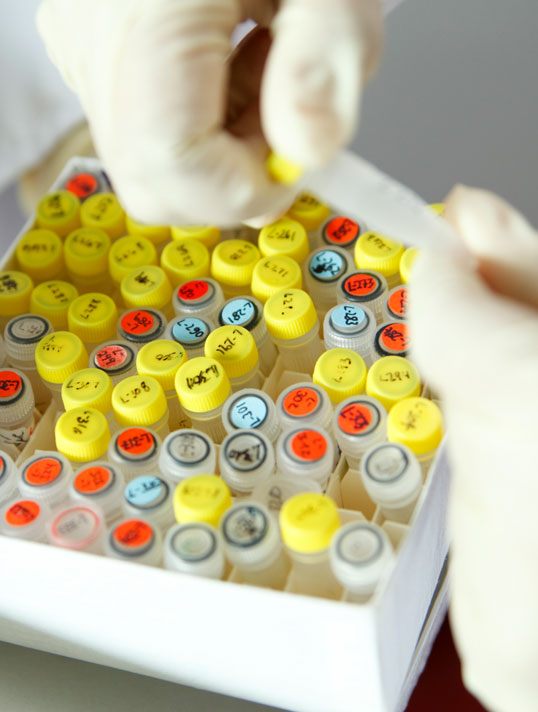About the Monogenic Hub
What is monogenic Parkinson's disease?
About
the Monogenic Hub
the Monogenic Hub
What is monogenic Parkinson's disease?
Although traditionally thought of as a 'sporadic' disorder,
we now know that genetics play a major role in the risk
of Parkinson's disease.
Common genetic variability at 90 loci has been associated with a risk for Parkinson's disease. Furthermore, mutations
in a single gene (i.e. monogenic factors) can cause Mendelian forms of Parkinson's disease, accounting
for approximately 5-10% of cases. Several genes have been well established as causing monogenic Parkinson's disease with medium to high penetrance, such as autosomal dominant forms and autosomal recessive forms. Mutations
in the gene causing Gaucher's disease, GBA, have also been linked to Parkinson's disease. Additionally,
there are monogenic forms of atypical Parkinson's disease presentations, such as PARK-ATP13A2 causing Kufor-Rakeb syndrome. Despite these discoveries, we suspect that many genes causing Parkinson's disease are yet to be discovered.
we now know that genetics play a major role in the risk
of Parkinson's disease.
Common genetic variability at 90 loci has been associated with a risk for Parkinson's disease. Furthermore, mutations
in a single gene (i.e. monogenic factors) can cause Mendelian forms of Parkinson's disease, accounting
for approximately 5-10% of cases. Several genes have been well established as causing monogenic Parkinson's disease with medium to high penetrance, such as autosomal dominant forms and autosomal recessive forms. Mutations
in the gene causing Gaucher's disease, GBA, have also been linked to Parkinson's disease. Additionally,
there are monogenic forms of atypical Parkinson's disease presentations, such as PARK-ATP13A2 causing Kufor-Rakeb syndrome. Despite these discoveries, we suspect that many genes causing Parkinson's disease are yet to be discovered.
By identifying these genes, we hope to gain further insights
into the underlying disease mechanisms of hereditary Parkinson's
disease, with the ultimate goal to translate our findings to
non-monogenic forms and to develop targeted therapies.

Although traditionally thought of as a 'sporadic' disorder, we
now know that
genetics plays a major role in the risk of Parkinson's disease.
Common genetic variability at 90 loci has been associated with a risk for Parkinson's disease. Furthermore, mutations in a single gene (i.e. monogenic factors) can cause Mendelian forms of Parkinson's disease, accounting
for approximately 5-10% of cases. Several genes have been well established as causing monogenic Parkinson's disease with medium
to high penetrance, such as autosomal dominant forms and autosomal recessive forms. Mutations in the gene causing Gaucher's disease, GBA, have also been linked
Common genetic variability at 90 loci has been associated with a risk for Parkinson's disease. Furthermore, mutations in a single gene (i.e. monogenic factors) can cause Mendelian forms of Parkinson's disease, accounting
for approximately 5-10% of cases. Several genes have been well established as causing monogenic Parkinson's disease with medium
to high penetrance, such as autosomal dominant forms and autosomal recessive forms. Mutations in the gene causing Gaucher's disease, GBA, have also been linked
to Parkinson's disease. Additionally, there are monogenic forms
of atypical Parkinson's disease presentations, such as
PARK-ATP13A2 causing Kufor-Rakeb syndrome. Despite these
discoveries, we suspect that
many genes causing
Parkinson's disease
are yet to be discovered.
are yet to be discovered.
By identifying these genes, we hope to gain further insights
into the underlying disease mechanisms of hereditary Parkinson's disease, with the ultimate goal to translate our findings to non-monogenic forms and to develop targeted therapies.
into the underlying disease mechanisms of hereditary Parkinson's disease, with the ultimate goal to translate our findings to non-monogenic forms and to develop targeted therapies.
Although traditionally thought of as a 'sporadic' disorder, we
now know that
genetics plays a major role in the risk of Parkinson's disease.
Common genetic variability at 90 loci has been associated with a risk for Parkinson's disease. Furthermore, mutations in a single gene (i.e. monogenic factors) can cause Mendelian forms of Parkinson's disease, accounting for approximately 5-10% of cases. Several genes have been well established as causing monogenic Parkinson's disease with medium to high penetrance, such as autosomal dominant forms
and autosomal recessive forms. Mutations in the gene causing Gaucher's disease, GBA, have also been linked
Common genetic variability at 90 loci has been associated with a risk for Parkinson's disease. Furthermore, mutations in a single gene (i.e. monogenic factors) can cause Mendelian forms of Parkinson's disease, accounting for approximately 5-10% of cases. Several genes have been well established as causing monogenic Parkinson's disease with medium to high penetrance, such as autosomal dominant forms
and autosomal recessive forms. Mutations in the gene causing Gaucher's disease, GBA, have also been linked
to Parkinson's disease. Additionally, there are monogenic forms
of atypical Parkinson's disease presentations, such as
PARK-ATP13A2 causing Kufor-Rakeb syndrome. Despite these
discoveries, we suspect that
many genes causing
Parkinson's disease are yet to be discovered.
By identifying these genes, we hope to gain further insights
into the underlying disease mechanisms of hereditary Parkinson's
disease, with the ultimate goal to translate our findings to
non-monogenic forms
and to develop targeted therapies.
and to develop targeted therapies.
Although traditionally thought of as a 'sporadic' disorder, we
now know that
genetics plays a major role in the risk of Parkinson's disease.
Common genetic variability at 90 loci has been
associated with a risk for Parkinson's disease. Furthermore, mutations in a single gene (i.e. monogenic factors) can cause Mendelian forms of Parkinson's disease, accounting for approximately 5-10% of cases. Several genes have been well established as causing monogenic Parkinson's disease with medium to high penetrance, such as autosomal dominant forms
and autosomal recessive forms. Mutations in the gene causing Gaucher's disease, GBA, have also been linked
to Parkinson's disease. Additionally, there are monogenic forms of atypical Parkinson's disease presentations,
such as PARK-ATP13A2 causing Kufor-Rakeb syndrome. Despite these discoveries, we suspect that many genes causing Parkinson's disease are yet to be discovered.
Common genetic variability at 90 loci has been
associated with a risk for Parkinson's disease. Furthermore, mutations in a single gene (i.e. monogenic factors) can cause Mendelian forms of Parkinson's disease, accounting for approximately 5-10% of cases. Several genes have been well established as causing monogenic Parkinson's disease with medium to high penetrance, such as autosomal dominant forms
and autosomal recessive forms. Mutations in the gene causing Gaucher's disease, GBA, have also been linked
to Parkinson's disease. Additionally, there are monogenic forms of atypical Parkinson's disease presentations,
such as PARK-ATP13A2 causing Kufor-Rakeb syndrome. Despite these discoveries, we suspect that many genes causing Parkinson's disease are yet to be discovered.
By identifying these genes, we hope to gain further insights
into the underlying disease mechanisms of hereditary Parkinson's
disease,
with the ultimate goal to translate our findings to non-monogenic forms and to develop targeted therapies.
with the ultimate goal to translate our findings to non-monogenic forms and to develop targeted therapies.
Although traditionally thought of as a 'sporadic' disorder, we
now know that
genetics plays a major role
in the risk of Parkinson's disease.
Common genetic variability at 90 loci has been associated with a risk for Parkinson's disease. Furthermore, mutations in a single gene (i.e. monogenic factors) can cause Mendelian forms
of Parkinson's disease, accounting
for approximately 5-10% of cases. Several genes have been well established as causing monogenic Parkinson's disease with medium
to high penetrance, such
as autosomal dominant forms
and autosomal recessive forms. Mutations in the gene causing Gaucher's disease, GBA, have also been linked to Parkinson's disease. Additionally, there are monogenic forms of atypical Parkinson's disease presentations, such
as PARK-ATP13A2 causing Kufor-Rakeb syndrome. Despite these discoveries, we suspect
that many genes causing Parkinson's disease
are yet to be discovered.
in the risk of Parkinson's disease.
Common genetic variability at 90 loci has been associated with a risk for Parkinson's disease. Furthermore, mutations in a single gene (i.e. monogenic factors) can cause Mendelian forms
of Parkinson's disease, accounting
for approximately 5-10% of cases. Several genes have been well established as causing monogenic Parkinson's disease with medium
to high penetrance, such
as autosomal dominant forms
and autosomal recessive forms. Mutations in the gene causing Gaucher's disease, GBA, have also been linked to Parkinson's disease. Additionally, there are monogenic forms of atypical Parkinson's disease presentations, such
as PARK-ATP13A2 causing Kufor-Rakeb syndrome. Despite these discoveries, we suspect
that many genes causing Parkinson's disease
are yet to be discovered.
By identifying these genes,
we hope to gain further insights into the underlying disease mechanisms
of hereditary Parkinson's disease, with the ultimate goal
to translate our findings
to non-monogenic forms
and to develop targeted therapies.
we hope to gain further insights into the underlying disease mechanisms
of hereditary Parkinson's disease, with the ultimate goal
to translate our findings
to non-monogenic forms
and to develop targeted therapies.
Key GP2 Monogenic hub group members
The monogenic hub members are an international group
of researchers focusing on Parkinson's disease genetics.
of researchers focusing on Parkinson's disease genetics.
Key members include:





LEAD OF MONOGENIC HUB,
CO-LEAD OF SAMPLE PRIORITIZATION
CO-LEAD OF SAMPLE PRIORITIZATION
Christine Klein, MD
Institute of Neurogenetics, University
of Lübeck, Lübeck, Germany.
of Lübeck, Lübeck, Germany.
CO-LEAD OF MONOGENIC HUB
CO-LEAD OF MONOGENIC HUB
CO-LEAD OF MONOGENIC PORTAL
CO-LEAD OF MONOGENIC PORTAL
CO-LEAD OF SAMPLE PRIORITIZATION
Katja Lohmann, PhD
Niccolo Mencacci, MD, PhD
Enza Maria Valente, MD
Institute of Neurogenetics, University
of Lübeck, Lübeck, Germany.
of Lübeck, Lübeck, Germany.
Department of Neurology, Northwestern University Feinberg School
of Medicine,
Chicago, IL, USA.
Chicago, IL, USA.
IRCCS Mondino Foundation, Pavia; Department of Molecular
Medicine, University of Pavia, Pavia, Italy.
Shen-Yang Lim, MD, FRACP
Division of Neurology and the Mah Pooi Soo and Tan Chin Nam
Centre for Parkinson's and Related Disorders, Department
of Medicine, Faculty of Medicine, University of Malaya, Kuala Lumpur, Malaysia.
of Medicine, Faculty of Medicine, University of Malaya, Kuala Lumpur, Malaysia.
Kishore Kumar, MBBS,
PhD, FRACP
PhD, FRACP
Molecular Medicine Laboratory, Concord Repatriation General
Hospital, Sydney, Australia; Kinghorn Centre for Clinical
Genomics, Garvan Institute of Medical Research, Darlinghurst,
NSW, Australia; Sydney Medical School, University of Sydney,
Sydney, Australia.


CO-LEAD OF DATA ANALYSIS
Zih-Hua Fang, PhD
Genome Biology of Neurodegenerative Diseases, German Center
for Neurodegenerative Diseases (DZNE), Tübingen, Germany.
for Neurodegenerative Diseases (DZNE), Tübingen, Germany.

CLINICIAN SCIENTIST
Lara Mariah Lange, MD
Institute of Neurogenetics, University of Lübeck, Lübeck,
Germany.

CLINICIAN SCIENTIST
Eva-Juliane Vollstedt, MD
Institute of Neurogenetics, University of Lübeck, Lübeck,
Germany.


CLINICIAN SCIENTIST
Ai Huey Tan, MD, FRCP
University of Malaya, Kuala Lumpur, Malaysia.
CLINICIAN SCIENTIST
Melina Ellis, BSc

INFORMATICIAN
Harutyun Madoev, MS
Institute of Neurogenetics, University
of Lübeck, Lübeck, Germany.
of Lübeck, Lübeck, Germany.
Please visit the GP2 website to see individual profiles.
Anzac Research Institute/University
of Sydney
of Sydney
The monogenic hub members are an international group of
researchers focusing on Parkinson's disease genetics.
The monogenic hub members
are an international group
of researchers focusing
on Parkinson's disease genetics.
are an international group
of researchers focusing
on Parkinson's disease genetics.

CLINICIAN SCIENTIST
Ignacio Juan
Keller Sarmiento, MD
Keller Sarmiento, MD
Department of Neurology, Northwestern University Feinberg School
of Medicine,
Chicago, IL, USA.
Chicago, IL, USA.

LEAD OF DATA ANALYSIS
Peter Heutink, PhD
Genome Biology of Neurodegenerative Diseases, German Center
for Neurodegenerative Diseases (DZNE), Tübingen, Germany.
for Neurodegenerative Diseases (DZNE), Tübingen, Germany.

PHD STUDENT
Anastasia Illarionova
Genome Biology of Neurodegenerative Diseases, German Center for
Neurodegenerative Diseases (DZNE), Tübingen, Germany.

SCIENTIST
Julie Hunter, BSc. (Hons)
ANZAC Research Institute, Sydney, Australia.

CLINICIAN SCIENTIST
Micol Avenali, MD
IRCCS Mondino Foundation, Pavia; Department of Brain and
Behavioural Sciences, University
of Pavia, Pavia, Italy.
of Pavia, Pavia, Italy.
Alumni:
The ASAP project
The Aligning Science Across Parkinson's (ASAP) initiative
involves researchers across the globe working as a team to
provide novel insights into the biology underlying Parkinson's
disease. We hope that a better understanding of disease pathways
in Parkinson's disease will lead to the development of new
treatments for this condition.
The project will use large-scale, transparent, and open access
data sharing to accelerate scientific discovery and inform the
path to a cure.

The Aligning Science Across Parkinson's (ASAP) initiative
involves researchers across the globe working as a team to
provide novel insights into the biology underlying Parkinson's
disease. We hope that a better understanding of disease pathways
in Parkinson's disease will lead to the development of new
treatments
for this condition.
for this condition.
The project will use large-scale, transparent, and open access
data sharing to accelerate scientific discovery and inform the
path
The Aligning Science Across Parkinson's (ASAP) initiative
involves researchers across the globe working as a team to
provide novel insights into the biology underlying Parkinson's
disease. We hope that a better understanding of disease pathways
in Parkinson's disease will lead to the development of new
treatments for this condition.
The project will use large-scale, transparent, and open access
data sharing to accelerate scientific discovery
and inform the path to a cure.
and inform the path to a cure.
The Aligning Science Across Parkinson's (ASAP) initiative
involves researchers across the globe working as a team to
provide novel insights into the biology underlying Parkinson's
disease. We hope that a better understanding of disease pathways
in Parkinson's disease will lead to the development of new
treatments
for this condition.
for this condition.
The project will use large-scale, transparent, and open access
data sharing to accelerate scientific discovery and inform the
path
to a cure.
to a cure.
The Aligning Science Across Parkinson's (ASAP) initiative
involves researchers across the globe working as a team to
provide novel insights into the biology underlying Parkinson's
disease. We hope
that a better understanding
of disease pathways in Parkinson's disease will lead to the development of new treatments for this condition.
that a better understanding
of disease pathways in Parkinson's disease will lead to the development of new treatments for this condition.
The project will use large-scale, transparent, and open access
data sharing to accelerate scientific discovery and inform the
path to a cure.
The GP2 project
The Global Parkinson's Genetics Program (GP2) project
is a major international collaborative effort to uncover new insights into the genetic basis of Parkinson's disease.
The GP2 project is funded by the Aligning Science Across Parkinson's (ASAP) initiative.
is a major international collaborative effort to uncover new insights into the genetic basis of Parkinson's disease.
The GP2 project is funded by the Aligning Science Across Parkinson's (ASAP) initiative.
The Global Parkinson's Genetics Program (GP2) project is a major
international collaborative effort to uncover new insights into
the genetic basis of Parkinson's disease. The GP2 project is
funded by the Aligning Science Across Parkinson's (ASAP)
initiative.
The Global Parkinson's Genetics Program (GP2) project is a major
international collaborative effort
to uncover new insights
into the genetic basis of Parkinson's disease. The GP2 project is funded by the Aligning Science Across Parkinson's (ASAP) initiative.
to uncover new insights
into the genetic basis of Parkinson's disease. The GP2 project is funded by the Aligning Science Across Parkinson's (ASAP) initiative.
There are several key strategic objectives:



to support meaningful collaboration
to generate research resources
to democratize data
There are several
key strategic objectives:
key strategic objectives:
There are two main scientific aims:
Determining the genetic basis
of typical, apparently sporadic PD
of typical, apparently sporadic PD
Enabling the discovery of novel causes of familial monogenic PD
1
2
1
Enabling the discovery
of novel causes of familial monogenic PD
of novel causes of familial monogenic PD
Determining the genetic basis of typical, apparently sporadic PD
There are two
main scientific aims:
main scientific aims:


